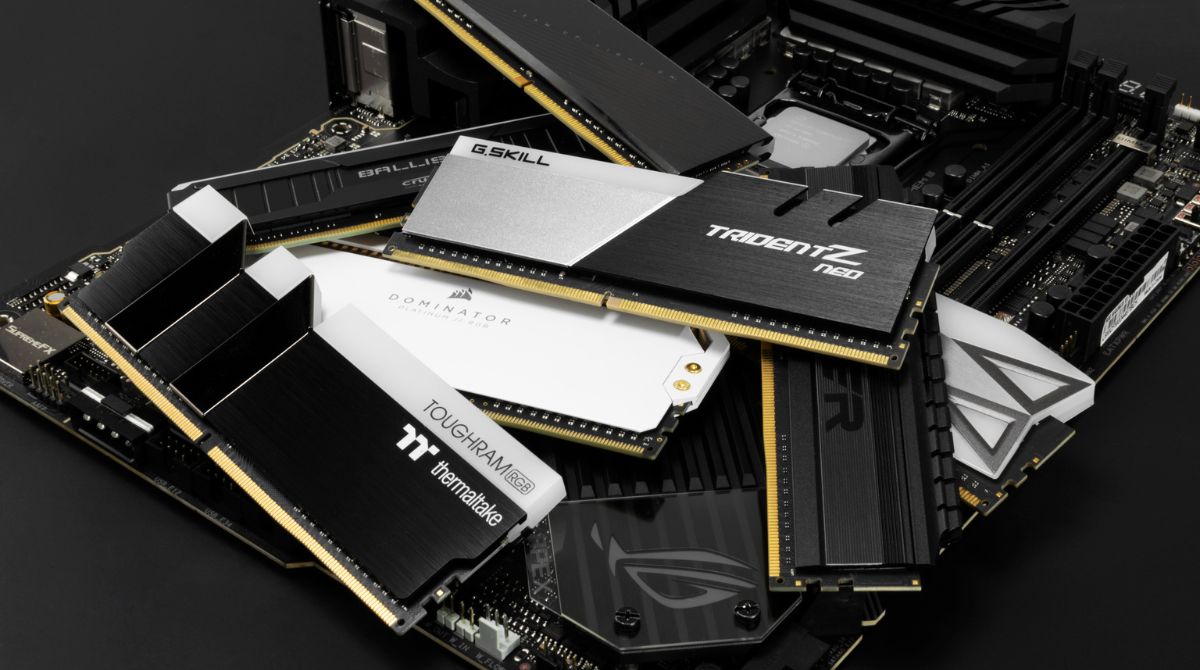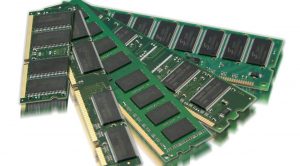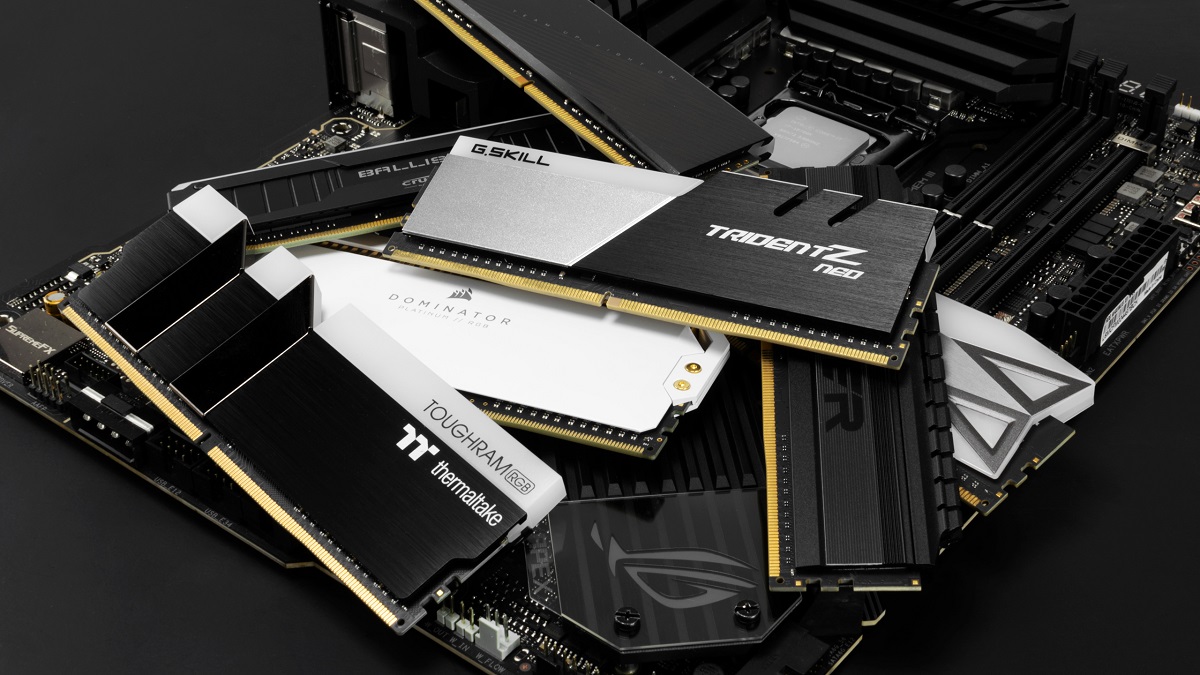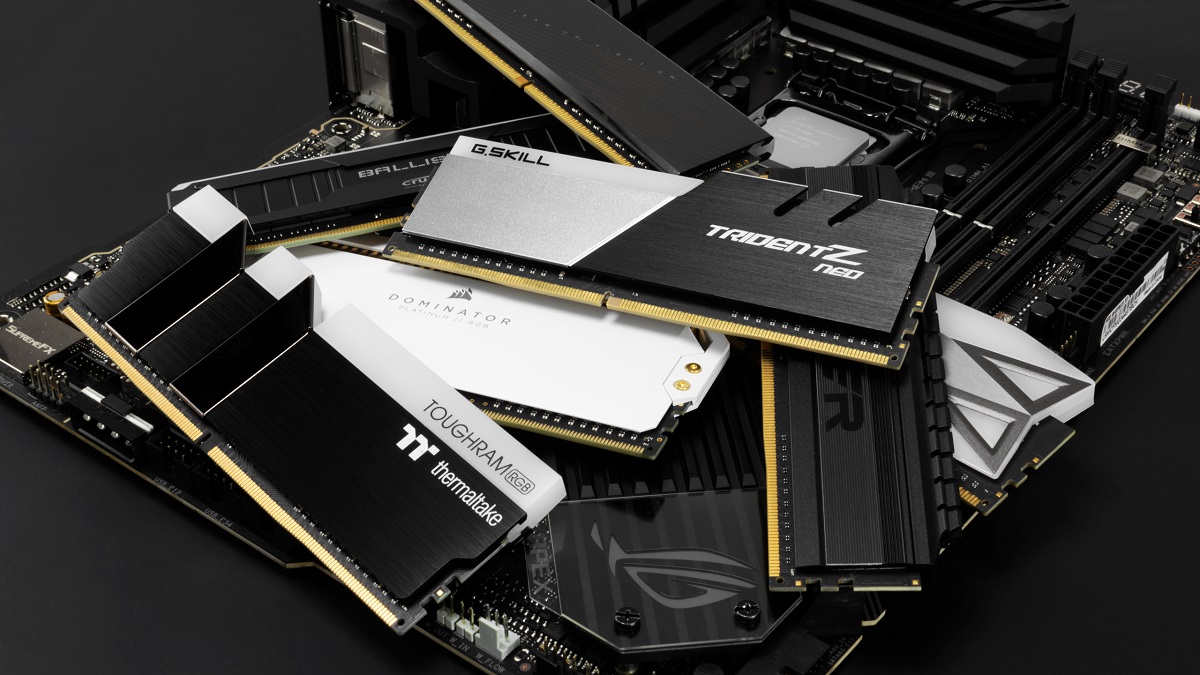Introduction
Welcome to the world of gaming! Whether you’re a casual gamer or a hardcore enthusiast, one thing is certain: having the right hardware is essential for an immersive gaming experience. When it comes to building or upgrading your gaming PC, choosing the right amount of RAM is crucial. RAM, or Random Access Memory, plays a vital role in the performance and responsiveness of your system while gaming.
In this article, we will explore the importance of RAM in gaming PCs and delve into the factors to consider when determining how much RAM you need. We will also discuss the minimum RAM requirements for popular games, the recommended RAM for optimal gaming performance, and provide some tips for managing RAM efficiency in gaming PCs.
Before we dive into the specifics, let’s briefly understand the purpose of RAM in a gaming PC. RAM is a form of temporary storage that stores data that the processor needs to access quickly. It acts as a middle ground between the slower permanent storage (like your hard drive or SSD) and the faster processor. It allows the system to quickly load and access data, which is crucial for smooth gameplay and reduced loading times. Essentially, the more RAM you have, the more data you can store for quick access, resulting in improved gaming performance.
Now that we have a basic understanding of the importance of RAM for gaming, let’s explore the factors you need to consider when determining how much RAM you need for your gaming PC. Understanding these factors will help you make informed decisions when building or upgrading your gaming rig.
Understanding RAM for Gaming
Before we delve into the specifics of how much RAM you need for gaming, let’s take a closer look at how RAM functions and its significance in optimizing your gaming experience.
RAM, or Random Access Memory, serves as the temporary storage space that your computer’s processor uses to perform tasks and store data while it is actively running. When you launch a game, it gets loaded into the RAM, along with other necessary background processes and system resources, allowing for seamless gameplay.
One of the main advantages of RAM is its high-speed access, which is significantly faster than the storage on your hard drive or solid-state drive (SSD). This quick access allows your computer to swiftly retrieve and initialize game assets, textures, and other critical game data, which ultimately translates into smoother gameplay and reduced loading times.
It’s important to note that RAM is volatile memory, meaning it requires a constant power supply to retain the data stored in it. As a result, whenever you shut down your computer, all the data stored in RAM is lost. This is why it’s crucial to save your progress in games or any other important files to your permanent storage, such as a hard drive or SSD.
The capacity of RAM is measured in gigabytes (GB), and it determines how much data your computer can hold and access at any given time. It’s important to find the right balance in terms of RAM capacity to ensure optimal performance while gaming.
While it might be tempting to go for the highest possible RAM capacity available, it’s essential to understand that having more RAM doesn’t necessarily result in better gaming performance. There’s a threshold beyond which additional RAM becomes redundant as the processor can’t utilize it efficiently.
Additionally, it’s important to consider that RAM is just one aspect of your computer’s overall performance. Other hardware components, such as the CPU (Central Processing Unit) and GPU (Graphics Processing Unit), also play a significant role in determining the overall gaming experience.
In the next section, we will discuss the factors you should consider when determining how much RAM you need for your gaming PC. Understanding these factors will help you make an informed decision when building or upgrading your gaming rig.
Factors to Consider when Determining How Much RAM You Need
Choosing the right amount of RAM for your gaming PC can directly impact your gaming performance and overall user experience. To determine how much RAM you need, it’s important to consider the following factors:
- Game Requirements: The RAM requirements for each game can vary. Some games may have minimum and recommended RAM specifications listed in their system requirements. It’s advisable to check the game’s official website or documentation to get an idea of the recommended RAM for optimal performance.
- Multi-tasking: If you tend to multitask while gaming, such as running background applications or streaming, you’ll need more RAM to accommodate the extra load. Running multiple applications simultaneously can consume a significant amount of RAM, so it’s recommended to have additional RAM if you’re a heavy multitasker.
- Operating System: The RAM requirements can vary based on the operating system you’re using. While the minimum RAM required for most modern operating systems is usually around 4GB, it’s advisable to have more RAM for better performance and future-proofing your system.
- Growth Potential: Consider your future needs and how long you plan to use your gaming PC. Games are becoming more demanding over time, and having extra RAM can help ensure that your system remains capable of running future games without any performance issues.
- Budget: RAM prices fluctuate, so it’s essential to consider your budget when determining how much RAM you can afford. Consider the balance between performance and cost to make an informed decision.
While these factors can provide guidance, it’s crucial to strike a balance between your budget and the recommended specifications. Generally, for most gaming purposes, having 8GB to 16GB of RAM is considered sufficient. However, if your budget allows, opting for 16GB or even 32GB can provide you with more headroom for multitasking and future gaming needs.
Next, we will discuss the minimum RAM requirements for popular games to give you a better idea of the memory needs for specific games.
Minimum RAM Requirements for Popular Games
When it comes to gaming, different games have different RAM requirements. While it’s always recommended to have more RAM than the minimum requirements for optimal performance, knowing the minimum RAM needed for popular games can help you gauge the baseline for your gaming PC. Here are the minimum RAM requirements for some popular games:
- Fortnite: The minimum RAM requirement for Fortnite is 8GB. However, to enjoy smoother gameplay and avoid potential performance issues, it’s advisable to have at least 16GB of RAM.
- Grand Theft Auto V: GTA V recommends a minimum of 8GB of RAM. For a better experience, especially if you’re interested in playing with mods or higher graphics settings, 16GB or more of RAM is recommended.
- The Witcher 3: Wild Hunt: The minimum RAM requirement for The Witcher 3 is 6GB. However, to fully experience this graphically-intensive game, it’s recommended to have 8GB or more of RAM.
- Overwatch: Overwatch requires a minimum of 4GB of RAM. However, to ensure smoother gameplay and to avoid any performance issues, 8GB or more of RAM is recommended.
- PlayerUnknown’s Battlegrounds (PUBG): The minimum RAM requirement for PUBG is 8GB. However, to enjoy a more optimized gaming experience, especially when playing on higher settings or streaming, 16GB or more of RAM is recommended.
These are just a few examples, and the RAM requirements can vary from game to game. It’s always a good idea to check the specific game’s system requirements to ensure that your gaming PC meets the minimum specifications.
Remember, these are minimum requirements, and having more RAM than the recommended specifications can significantly improve your gaming experience and allow for smoother multitasking. In the next section, we will discuss the recommended RAM for optimal gaming performance.
Recommended RAM for Optimal Gaming Performance
While the minimum RAM requirements give you a baseline, it’s often recommended to have more RAM for optimal gaming performance. Having adequate RAM ensures that your gaming PC can handle the game’s demands without encountering performance bottlenecks. Here are some general recommendations for optimal gaming performance:
- 8GB of RAM: For casual gaming and older titles, 8GB of RAM can provide a decent gaming experience. It allows for smooth gameplay in most games with moderate settings and minimal multitasking.
- 16GB of RAM: This is the sweet spot for most gamers today. With 16GB of RAM, you can comfortably play modern games, stream your gameplay, and run background applications without significant performance issues.
- 32GB of RAM: If you’re a serious gamer, content creator, or plan to future-proof your system, 32GB of RAM provides an ample amount of memory. It allows for seamless gameplay in resource-intensive games, multitasking with a wide range of applications, and handling memory-intensive tasks such as video editing or 3D rendering.
Having more RAM than the recommended specifications allows your system to efficiently handle various tasks simultaneously, resulting in smoother overall performance. It also provides headroom for future game releases and ensures that your gaming PC remains relevant for a longer period.
Remember that RAM is just one component of your gaming PC, and other factors like the CPU and GPU also influence gaming performance. It’s important to have a balanced system that can handle the demands of modern games.
Now that we have discussed the recommended RAM for optimal gaming performance, let’s explore the option of upgrading your RAM to enhance your gaming experience.
Upgrading RAM for a Better Gaming Experience
If you’re experiencing performance issues or want to enhance your gaming experience, upgrading your RAM can be an effective solution. By increasing the amount of RAM in your system, you can improve game loading times, minimize stuttering, and increase overall responsiveness. Here are a few steps to consider when upgrading your RAM:
- Check Compatibility: Before purchasing new RAM modules, it’s crucial to ensure compatibility with your existing hardware. Check your motherboard’s specifications to determine the type and speed of RAM it supports.
- Determine the Required Capacity: Evaluate your gaming needs and the recommended specifications of the games you play. If you find that your current RAM is constantly maxed out or causing performance issues, consider upgrading to a higher capacity module.
- Install the New RAM: Shut down your computer and follow the manufacturer’s instructions to install the new RAM modules. Ensure that the modules are properly seated in the RAM slots and securely fastened before powering on your system.
- Configure BIOS: In some cases, after upgrading your RAM, you may need to enter your computer’s BIOS settings to adjust the RAM frequency or enable the XMP (Extreme Memory Profile) to ensure optimal performance and stability.
- Test and Verify: Once your system is back up and running, verify that the new RAM is recognized by your operating system. You can use system monitoring tools or task manager to check the amount of installed RAM and ensure that it’s functioning correctly.
Upgrading your RAM is a cost-effective way to boost your gaming performance without having to replace other expensive components. However, it’s important to note that increasing your RAM alone won’t fix all performance issues. The overall performance of your gaming PC is dependent on various factors such as CPU, GPU, and storage speed.
Additionally, it’s advisable to consider future-proofing your system by opting for higher capacity RAM modules. This way, you can ensure your gaming PC can handle upcoming game releases and perform smoothly for a longer duration.
Now that we’ve discussed upgrading your RAM, let’s explore some tips for managing RAM efficiency in gaming PCs.
Tips for Managing RAM Efficiency in Gaming PCs
Managing your RAM efficiently is essential to maximize system performance and ensure smooth gaming experiences. Here are some helpful tips to optimize RAM usage in your gaming PC:
- Close Unnecessary Programs: Before launching a game, close any unnecessary programs running in the background. These programs consume memory and can affect gaming performance.
- Disable Startup Programs: Adjust your system’s startup settings to prevent unnecessary programs from launching automatically. This can help free up RAM and improve boot times.
- Update Drivers: Ensure that your device drivers, including graphics card and motherboard drivers, are up to date. Outdated drivers can lead to compatibility issues and impact system performance.
- Optimize In-Game Settings: Adjusting in-game settings, such as lowering graphics details or disabling resource-intensive features, can reduce the amount of RAM required by the game and improve overall performance.
- Monitor Resource Usage: Use monitoring software to keep an eye on your system’s resource usage. This can help identify any programs or processes that are consuming excessive amounts of RAM and take appropriate action.
- Consider RAM Disk: Utilize RAM disk software to allocate a portion of your RAM as a virtual drive. This can be useful for storing temporary files or caching game data, enhancing read and write speeds as compared to traditional storage devices.
- Run Regular Maintenance: Perform regular system maintenance, such as disk cleanup and defragmentation, to optimize your storage and improve overall system performance.
- Upgrade to SSD: Consider upgrading your storage to a Solid-State Drive (SSD) if you haven’t already. SSDs provide significantly faster read and write speeds, improving the overall responsiveness of your system and reducing RAM utilization.
By implementing these tips, you can ensure that your gaming PC efficiently utilizes available RAM, leading to smoother gameplay and a more enjoyable gaming experience.
Now that we’ve explored tips for managing RAM efficiency, let’s summarize the key points discussed throughout the article.
Conclusion
Choosing the right amount of RAM for your gaming PC is crucial for optimal performance and a seamless gaming experience. RAM plays a significant role in loading game assets, reducing loading times, and ensuring smooth gameplay. While the minimum RAM requirements provide a baseline, it’s often beneficial to have more RAM to future-proof your system and handle multitasking.
When determining how much RAM you need, consider factors such as game requirements, multitasking, operating system, growth potential, and your budget. Aim for a balance between performance and cost, ensuring that you have enough RAM to handle multiple tasks simultaneously and future games that may have higher memory demands.
Upgrading your RAM can be a cost-effective way to improve gaming performance, but it’s important to remember that RAM is just one component of your gaming PC. A balanced system, including a powerful CPU, GPU, and fast storage, is essential for an optimal gaming experience.
To manage your RAM efficiently, close unnecessary programs, disable startup programs, update drivers, optimize in-game settings, monitor resource usage, consider RAM disk, and run regular maintenance. These practices can help free up RAM and optimize its usage, resulting in improved system performance.
In conclusion, understanding the importance of RAM for gaming and considering various factors while determining the appropriate amount of RAM for your gaming PC is crucial. With the right amount of RAM and proper management, you can elevate your gaming experience and immerse yourself in the virtual worlds of your favorite games.
























